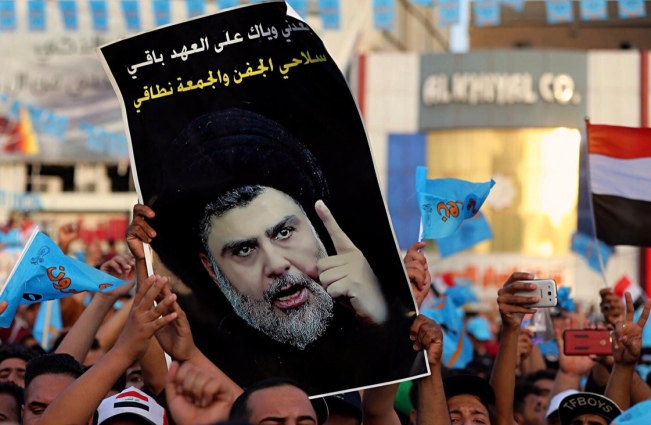ERBIL, Kurdistan Region – Firebrand Shiite cleric Muqtada al-Sadr has called on Iraqis to resume the nationwide protests against corruption, unemployment, and the lack of public services.
Several of Iraq’s central and southern cities, including the capital Baghdad, were rocked by violent protests in early October, which left at least 108 dead and more than 6,000 injured.
In a long statement published on his Facebook page late on Saturday, Sadr called on his supporters and the public to return to the streets on Friday, October 25 to resume the protests.
Sadr is head of the Sayirun alliance, the largest bloc in the Iraqi parliament. He is also head of the Saraya al-Salam militia, which is part of Popular Mobilization Forces (PMF) umbrella, also known as Hashd al-Shaabi in Arabic.
“The government leaders and politicians are in a state of fear because of you, they are completely unable to fix anything within this country,” Sadr’s statement read. “Therefore, I ask everyone to start the revolution which will clean Iraq from corrupters and fools.”
Sadr has withdrawn his backing for the government of Adil Abdul-Mahdi in the wake of the protests and called for fresh elections. He accused Iraq’s top politicians of being under the influence of foreign powers – particularly arch rivals Iran and the United States.
“Those politicians and government leaders are taking orders from people who are outside of Iraq’s borders, and they cannot take any step without their permission,” Sadr said.
He urged the protesters not to be cowed into silence by threats.
“They will accuse you of being a Baathist or a rioter, but keep moving forward and we will all chat together: ‘No, no Baath, No, no America’,” Sadr added.
The firebrand cleric has long championed reform and anti-corruption, leading the so-called “million-man” protests in 2016-17. He is a prominent nationalist who wants both Iran and the US to stop meddling in Iraq’s internal affairs.
In May 2018, Sadr’s Sayirun alliance of Shiites and communists became the biggest bloc in parliament. Although he didn’t run for office himself, Sadr emerged as kingmaker, playing a major role in the formation of the federal government.
It was at Sadr’s insistence that Abdul-Mahdi, an independent technocrat, became prime minister. He also sought to set the agenda as Iraq emerged from years of ruinous war.
Iraqi security forces and armed militias responded to October’s protests with tear gas, water cannons, rubber bullets, and live ammunition. The protesters burned down several governorate and militia buildings.
Sadr appealed to the protesters to remain peaceful and to “avoid use of weapons and violence while protesting”.
Likewise, he called on Iraq’s security forces “to avoid arresting protesters as they are neither Islamic State (ISIS) terrorists nor invaders”. Militias should play no part in policing demonstrations, he added.
The protests, which began on October 1, died down after about a week. Abdul-Mahdi urged the demonstrators to give his government time to implement reforms and bring corrupt officials to justice. Critics say he has moved too slowly.
The start of the religious observance of Arbaeen, when millions of Shiite Muslims from around the world march to the holy city of Karbala, also led to the protests being put on hold. The protests are widely expected to resume after the pilgrimage ends on October 20.
The procession into Karbala reflected the political mood, however. Pilgrims were heard to chant “No to America, no to Israel, no to corruption” and “Baghdad is free, corruption must go!” AP reports.
No comments:
Post a Comment